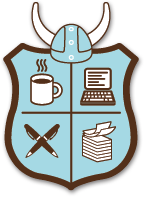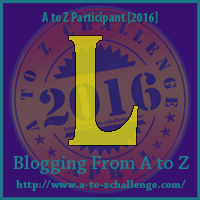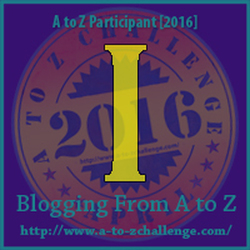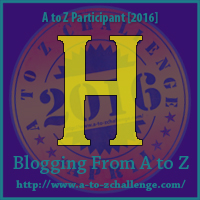

|
My theme for the April A to Z blogging challenge is productivity for creative people.  I started this post with Quit Something as the title, with the “something” to be determined. (Last year, my post was Quit Bad Habits.)  Then I realized that Quit Something was actually a great title. Because it doesn’t matter what you specifically eliminate. Find the task that is not useful, that does not bring joy, that is not required, and quit doing it. Maybe you can stop watching a TV show you no longer love or unsubscribe from newsletters that you delete without reading. Or maybe quit multitasking, if nothing else comes to mind. Is there something you can quit (or say no to) in order to regain some time? Even small increments add up.
My theme for the April A to Z blogging challenge is productivity for creative people.  Sometimes I think I procrastinate by reading books about productivity. The irony! If you want to try this method of procrastination, too, here are some books that I recommend: Die Empty: Unleash Your Best Work Everyday by Todd Henry First Things First by Stephen R. Covey Getting Things Done: The Art of Stress-Free Productivity by David Allen Manage Your Day-To-Day: Build Your Routine, Find Your Focus, and Sharpen Your Creative Mind, edited by Jocelyn K. Glei 168 Hours: You Have More Time Than You Think by Laura Vanderkam 7 Secrets of the Prolific: The Definitive Guide to Overcoming Procrastination, Perfectionism, and Writer's Block by Hillary Rettig (Thanks to author Maria E. Andreu for recommending this one.) Do you have any favorite books about productivity, time management, decluttering, or simplifying?
By Yvonne Ventresca My theme for the April A to Z blogging challenge is productivity for creative people.  OneTab is my newest favorite application. I installed it to work with Google Chrome so that when I have a lot of windows open with articles and blog posts I want to save for later, I click on OneTab and it makes a nice list of links for me in a single place. You can then reorder and categorize them. For example, I have “Read Later” and “Blog Ideas” as categories. It’s a convenient way to save temporary links that I don’t want to bookmark until I’ve read them.  OneTab OneTab Do you have any technology tools or applications that make you more productive? My theme for the April A to Z blogging challenge is productivity for creative people.  November is National Novel Writing Month, and whether or not you’ve tried to accomplish writing a novel in four weeks, I think there are some useful principles that can be applied throughout the year. (April is Camp NaNoWriMo if you are interested.) Principles for Any Month
Have you ever tried NaNoWriMo or creating in a crunch-time atmosphere?
My theme for the April A to Z blogging challenge is productivity for creative people.  _Why do so many of us start our day with email instead of a creative project? Daniel Ariely says, “For many things, it’s hard to figure out how much progress you’re making. When you answer a thousand e-mails, you see every e-mail you answer” (“Understanding Our Compulsions,” Managing Your Day-To-Day). So there isn’t necessarily that sense of progress for a bigger project. While it’s satisfying to see your inbox hit zero emails, it’s harder to measure a novel revision. One solution is to brainstorm ways to track progress. For first drafts, writers can do words written, and seeing the wordcount grow satisfies. But what about revisions? What about an artistic project?  One idea is to count the hours spent, if that makes you feel accomplished. Another method is break a larger project into pieces. Novels can be divided into chapters. Break an art project into distinct phases. Or track the number of days you’ve worked on something in a row, creating a chain of success, an idea Jerry Seinfeld implemented to write jokes on a regular basis. The visual chain of Xs serves as a source of encouragement, so you don't break the chain. Do you like Xs on a calendar? Gold stars? Increased word count? Other ideas?
My theme for the April A to Z blogging challenge is productivity for creative people.  L is for lessons learned, through three quotes from Lincoln, Lee, and Lakein. “The best thing about the future is that it comes one day at a time.” ~Abraham Lincoln “If you spend too much time thinking about a thing, you’ll never get it done.” ~Bruce Lee And finally, from Alan Lakein: Do any of these quotes resonate?
Share your own favorites, L-authored or not. My theme for the April A to Z blogging challenge is productivity for creative people.  How do you spend the bulk of the time that you control? (Time may not be 100% in our control -- some people have day jobs, and almost everyone has certain commitments that they can’t eliminate.) Understanding the facts versus the perception of where time goes can help solve the problem. Author Laura Vanderkam recommends tracking your time for a week (168 consecutive hours). She said, “If you want to spend your time better, you need to know how you’re spending it now.” I’ve done this a few times in the past for the entire week and it always proves enlightening. (By the way, there are apps to track your time, but I use the low tech approach of pen and paper and tally it at the end of each day.)  On an ongoing basis, I continue to track my “writing work time.” This is the time I spend on my writing-related stuff, but it could be used to create a new novel, to promote Pandemic, to blog, to participate in a book festival, etc. Ideally, I’d like to spend the bulk of my time creating, but when I looked at the hours for 2014 when Pandemic was published, it didn’t align that way. A large percentage of my time was spent on publicity. Now I check each month: what percentage of my time is spent writing? Am I happy with the amount of time spent? Do you think you have a good understanding of how you use your time? Are you happy with the way your time, over the course of any given week, is spent?
My theme for the April A to Z blogging challenge is productivity for creative people.  I used to keep an ongoing journal, and I recently started journaling again by writing “morning pages” as described by Julia Cameron in The Artist’s Way. Basically, she recommends that you write three pages by hand first thing each morning. In the beginning, I pretty much hated this. It felt like one more thing I had to do each day. But after about two months, it became a useful part of my routine. Sometimes I vent. Sometimes I daydream on the page about my work-in-progress until I can barely wait to work on it. Sometimes I think of ideas that get transcribed onto my to do list. It’s like a mini-brain-dump on the page. I like using a cheap spiral-bound notebook (rather than a nice journal) so I don’t feel pressure to record anything "important." (As an aside, some people use Bullet Journals which is more of a way to track tasks and goals than it is a free-form writing journal. I have yet to experiment with this, but you can learn more about it at Bullet Journal--Getting Started. ) These two articles link journaling to productivity: The #1 Productivity Tool You Aren't Using and Start this Simple Habit to Rocket Your Productivity: Journaling.) I do think it helps me have a certain positive mindset to start the day and increases my focus for the creative work ahead. Have you ever kept a journal? Do you keep one now? If so, how do you find it helpful?
My theme for the April A to Z blogging challenge is productivity for creative people.  To improve personal productivity, Ivy Lee offered simple advice in the early 1900s that still works today. Each night, make a list of the six most important things that need to be done the next day, in order of priority. Tackle and complete the first task before moving on to the second one. Complete the second before the third, and so on. At the end of the day, put any remaining tasks on the next day’s list. Although this sounds simple, that’s part of its appeal. But there are several underlying principles here. This method requires you to limit your tasks, prioritize (do you know the most important thing you should be doing?), focus on the work at hand, and complete the most critical tasks first. You can read more in James Clear's post, The Ivy Lee Method: The Daily Routine Experts Recommend for Peak Productivity. To get this method to work for me, I need to break down my most important tasks into manageable pieces. So “write the next novel” becomes “revise chapter one” and “promote Pandemic” becomes “research upcoming book festivals.” Writing A to Z posts can be broken down into smaller tasks, too! Does this method appeal to you at all? Do you have a limited daily to do list?
My theme for the April A to Z blogging challenge is Productivity for Creative People.  If you blog about writerly things, tweet industry news, or provide content on a Facebook author page, social media can be a necessary evil. The key, in these instances, is to “curate”--pull out the interesting tidbits you can use or share from the constant stream of information. Wouldn’t be wonderful if interesting items came to you, instead of having to scour the Internet looking for them? Here are three ways to make it happen: Three Curation Tools
Do you actively monitor social media, blogs, and other online sources for interesting stories? Share your own tools or methods below.
|
JOIN NOW!
Sign up for Yvonne's newsletter for exclusive content, book news, and other occasional author goodies. Archives
October 2024
Categories
All
|